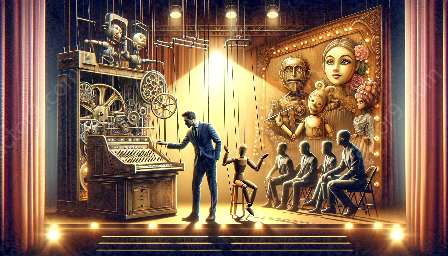Puppetry has been a powerful and engaging art form that has captivated audiences for centuries. When it comes to children, puppetry offers more than just entertainment. In this article, we'll explore the impact of puppetry on children's cognitive development and its relevance to puppetry in education.
Puppetry: A Versatile Educational Tool
Puppetry in education has long been recognized as a versatile and effective tool for engaging students in learning. The use of puppets in the classroom can create a dynamic and interactive learning environment where children can explore various subjects and develop essential skills.
When incorporated into educational settings, puppets have the ability to capture children's attention and make learning experiences more enjoyable. Through puppetry, educators can convey complex concepts in a visually stimulating way, making it easier for children to grasp and retain information.
The Impact on Cognitive Development
Now, let's delve into the impact of puppetry on children's cognitive development. Puppetry can significantly influence various aspects of cognitive growth, including:
- Imagination and Creativity: Puppetry encourages children to use their imaginations and think creatively. By interacting with puppets, children can explore new ideas, create stories, and express themselves in unique ways.
- Language and Communication: Through puppetry, children have the opportunity to improve their language and communication skills. They can engage in conversations with puppets, practice storytelling, and enhance their vocabulary.
- Emotional and Social Development: Puppets can serve as relatable characters that help children navigate and understand emotions. By interacting with puppets, children can develop empathy, learn about social interactions, and gain a better understanding of their emotions.
- Critical Thinking and Problem-Solving: Puppetry stimulates critical thinking and problem-solving skills. Children can analyze situations presented through puppetry, make decisions for the characters, and develop a deeper understanding of cause and effect.
- Memory Retention: Engaging with puppets and stories can enhance children's memory retention. The visual and interactive nature of puppetry can help children remember information and stories more effectively.
Enhancing Learning Experiences
Incorporating puppetry into educational practices can enhance learning experiences in various ways. Whether it's through puppet shows, role-playing activities, or storytelling sessions, puppetry can create memorable and impactful learning opportunities for children.
When used in the classroom, puppets can be instrumental in making abstract concepts more tangible and relatable for children. For example, in a science lesson, puppets can illustrate scientific principles, making them more accessible to young learners.
Puppetry also encourages active participation, as children can engage with puppets through role-playing, storytelling, and problem-solving scenarios. This active involvement fosters a sense of ownership over the learning process and encourages collaborative learning among peers.
Puppetry as a Therapeutic Tool
Beyond educational settings, puppetry has also proven to be a valuable therapeutic tool for children. In therapeutic contexts, puppets can help children express their emotions, overcome challenges, and develop coping strategies.
Therapeutic puppetry allows children to externalize their concerns and fears by projecting them onto the puppets, which can make it easier for them to address and process their emotions. This form of expressive play can be particularly beneficial for children dealing with anxiety, trauma, or social difficulties.
Conclusion
In conclusion, puppetry has a far-reaching impact on children's cognitive development. From enhancing imagination and creativity to fostering language and communication skills, puppetry plays a vital role in promoting holistic cognitive growth in children. In educational settings, puppetry serves as a powerful tool for creating engaging and effective learning experiences, making complex concepts more accessible and relatable for young learners.
Furthermore, puppetry's therapeutic potential offers an avenue for children to express themselves, process emotions, and develop essential coping mechanisms. As educators and caregivers, recognizing the multifaceted benefits of puppetry can enable us to harness its potential in enriching the lives and cognitive development of children.


























